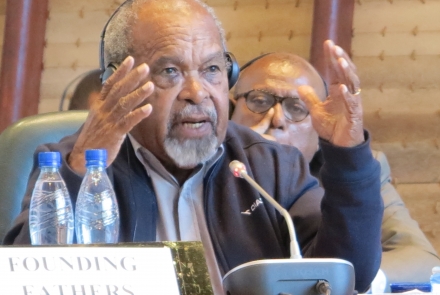
Photo by Ben Bohane
Vale Sir Michael Somare
The Pacific has lost a giant with the passing of Sir Michael Somare, but the man known as ‘the Chief’ leaves a lasting legacy both in Papua New Guinea and throughout the region, Henry Ivarature and Ben Bohane write.
Before he passed on 26 February 2021, Grand Chief Sir Michael Thomas Somare was a consummate politician – a one-man political institution.
He was one of the founding fathers of Papua New Guinea (PNG), a member of the famous Bully Beef Club, and a founding member of the Pangu Pati, the Papua and New Guinea United Party which left to form the National Alliance. He was also the most resilient politician of them all, unrivalled as a member of parliament (MP), prime minister (PM) and minister of state (MoS).
Until his retirement from politics in 2017, Sir Michael was an elected MP for 40 years – without a break. That made him the longest serving MP in the Commonwealth’s history.
In Sana, his autobiography published in 1975, Sir Michael wrote:
“the moment the party (i.e. Pangu Pati) was formed I knew that I would give up my career as a civil servant. The next years of my life, for better or worse, would be devoted to politics and to the struggle for independence”.
His political career began in 1968 as MP for East Sepik in the First House of Assembly (1968-1972). In the Second House of Assembly, also referred to as the first parliament, he led PNG to self-government as chief minister, and later to independence from Australia on 16 September 1975 as the country’s first PM. He led a coalition government with the support of four political parties, in so doing denied the United Party (UP), the single largest political party with 42 elected members, the opportunity to form a government.
Sir Michael was an MP through nine parliaments and was either PM or an MoS in all but one – the ninth parliament (2012-2017) when he was Governor of East Sepik Province. All told, Sir Michael was elected as PM of PNG five times. It’s a political feat, and in PNG politics it’s a record that is unlikely to be broken.
In a country where PMs are frequently ousted from office through motions of no-confidence votes, Sir Michael is the only MP to have completed two full terms of parliament as PM. His first full-term in office was in the first parliament, from 1972 to 1977. The second full-term in was in the seventh, from 2002 to 2007.
Yet Sir Michael wasn’t immune from this leadership instability. In the second parliament (1977-1982), he was defeated, after three attempts, by Sir Julius Chan in the country’s first successful no-confidence vote. Sir Julius was his Deputy Prime Minister. In the third parliament (1982-1987), he was replaced as PM by Paias Wingti, also his deputy, in a no-confidence vote on 21 November 1985.
Sir Michael was on the verge of completing a third full term as PM in the eighth parliament (2007-2012), but was ousted for a third time, replaced on this occasion by Peter O’Neill. This occurred under controversial circumstances, while he was very ill in Singapore.
Sir Michael also served as a MoS under two prime ministers. The first occasion was as foreign minister under Sir Rabbie Namaliu during the fourth parliament. The second occurred under the prime ministership of late Sir Mekere Morauta, who recently passed away in December 2020. In addition to foreign affairs, Sir Michael also held the mining and Bougainville affairs portfolios.
Sir Michael was prime minister, including as chief minister for a total of approximately 21 years. He was an MS under a prime minister for approximately five years. That’s a combined total of 26 years either as a PM or an MS.
But after a lifetime of politics and public service, age and ill-health had taken its toll. Sir Michael sacrificed and devoted his life to PNG and the region. He will be remembered as the man who brought 1,000 tribes together into one nation, and as a regional statesman key to the evolution and architecture of the Pacific Island Forum and Melanesian Spearhead Group.
At this time of uncertainty for Pacific regionalism, where personal connections amongst regional leaders matter for regional solidarity and cooperation, Sir Michael’s passing ought to be a reminder of how important personal relations bound leaders together in pursuit of a common selfless cause.
Writing in the forward to Sir Michael’s autobiography, then-Member for Buin Open in the Second House of Assembly Sir Paul Lapun, reflected on the character of a man who will be sorely missed. He wrote:
“Only an outstanding man could have gained the loyalty and support of practically the whole country. I think this is possible because we all see Michael Somare as a statesman and a true Papua New Guinea nationalist… Though he will soon be prime minister, for many of us he will always be ‘the Chief’.”
Vale Sir Michael Somare.
Updated: 13 July 2024/Responsible Officer: Crawford Engagement/Page Contact: CAP Web Team













